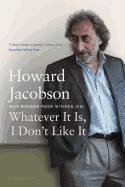
The Finkler Question
A Novel
کتاب های مرتبط
- اطلاعات
- نقد و بررسی
- دیدگاه کاربران
نقد و بررسی

Starred review from October 11, 2010
Winner of the 2010 Booker Prize, Jacobson’s wry, devastating novel examines the complexities of identity and belonging, love and grief, through the lens of contemporary Judaism. Julian Treslove, a former BBC producer who works as a celebrity double, feels out of sync with his longtime friend and sometimes rival Sam Finkler, a popular author of philosophy-themed self-help books and a rabidly anti-Zionist Jewish scholar. The two have reconnected with their elderly professor, Libor Sevcik, following the deaths of Finkler and Libor’s wives, leaving Treslove—the bachelor Gentile—even more out of the loop. But after Treslove is mugged—the crime has possible anti-Semitic overtones—he becomes obsessed with what it means to be Jewish, or “a Finkler.” Jacobson brilliantly contrasts Treslove’s search for a Jewish identity—through food, spurts of research, sex with Jewish women—with Finkler’s thorny relationship with his Jewish heritage and fellow Jews. Libor, meanwhile, struggles to find his footing after his wife’s death, the intense love he felt for her reminding Treslove of the belonging he so craves. Jacobson’s prose is effortless—witty when it needs to be, heartbreaking where it counts—and the Jewish question becomes a metaphor without ever being overdone.

November 15, 2010
Elegiac—but also humorous—meditation on life's big questions: life, death, the nature of justice, whether to sleep with a German. The book won the 2010 Man Booker Prize.
Nearing the end of his 60s, Jacobson, who has likened himself to a "Jewish Jane Austen," is a very funny man. His lead character, a London media type named Julian Treslove, is not Jewish, but he might as well be: He has a Woody Allen–size complex of neuroses and worries, and "his life had been one mishap after another." Mugged by a woman who utters a mysterious syllable—"Ju," Treslove thinks—while going through his pockets, he finds himself about as angst-ridden as an angst-ridden person can be. His widower friends Finkler and Libor, great successes in their day, are no pikers in the angst department, though, lonely and full of the usual aches and veys; as Treslove notes, "A man without a wife can be lonely in a big black Mercedes, no matter how many readers he has." The three pass their days together gnawing various questions to the bone, not least whether, in the post-Holocaust days, it is possible to "contemplate having an affair with someone who looked German." (Consensus: No, even if that someone was Marlene Dietrich.) When Libor's great-niece, Hephzibah, sweeps into the picture, Treslove finds himself thinking much more about questions of the heart, even as Finkler, a writer of pop philosophy, is swept away in a flood of "ASHamed Jews" who "were not to blame for anything" but were in the thick of controversy all the same—for, Finkler sighs, the very word "Jew" (was that what Treslove's attacker was saying?) is "a password to madness...One little word with no hiding place for reason in it." Jacobson's gentle tale of urban crises of the soul slowly turns into an examination of anti-Semitism, of what it means to be Jewish in a time when "the Holocaust had become negotiable."
At turns a romp and a disquisition worthy of Maimonides; elegantly written throughout, and with plenty of punchlines too.
(COPYRIGHT (2010) KIRKUS REVIEWS/NIELSEN BUSINESS MEDIA, INC. ALL RIGHTS RESERVED.)

November 15, 2010
Julian Treslove is plagued by the notion that his life lacks substance. He has had only the most superficial relationships with women, two of whom bore him sons he has hardly seen, and his career is at an impasse, for he now makes his living as a celebrity double. He longs for the tangible lives of his best friends, both Jewish widowers. Middle-aged Sam Finkler is a wildly successful TV personality and author whose wife succumbed to cancer, while octogenarian Libor Sevick has lost the woman he was happily married to for more than 50 years. Julian becomes obsessed with the idea of becoming Jewish as a way to give his life meaning and embarks on a personal odyssey in which he learns Yiddish, takes a Jewish lover, and becomes involved with the Museum of Anglo-Jewish Culture. Jacobson uses Julians transformation as a way of examining, often with a mordant wit reminiscent of comedian Larry Davids, what it means to be Jewish. Winner of the 2010 Man Booker Prize, this novel also offers poignant insights into the indignities of aging, the competitiveness of male friendship, and the yearning to belong.(Reprinted with permission of Booklist, copyright 2010, American Library Association.)

























دیدگاه کاربران